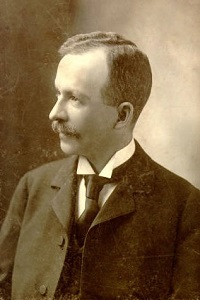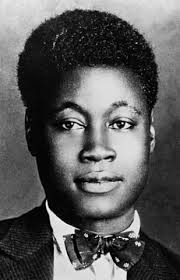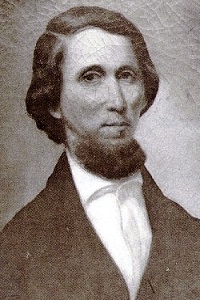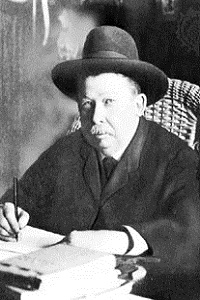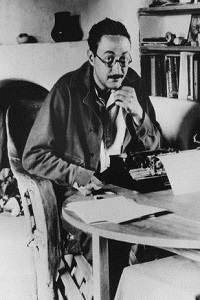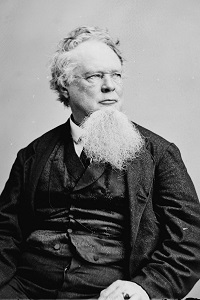The Audio Library of
Classic Southern Literature
1676 to 1923
Made possible by 
Visit our Children's literature site 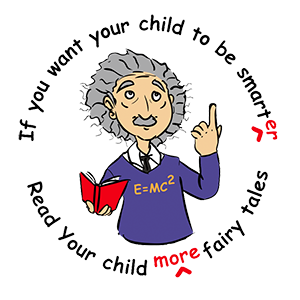
Grayling, Chapter 3
Written Text
Somewhat wondering that the major should have turned aside from the track, though without attaching to it any importance at that particular moment, James Grayling took up the borrowed axe and hurried back to the encampment, where the toil of cutting an extra supply of light-wood to meet the exigencies of the ensuing night, sufficiently exercised his mind as well as his body, to prevent him from meditating upon the seeming strangeness of the circumstance. But when he sat down to his supper over the fire that he had kindled, his fancies crowded thickly upon him, and he felt a confused doubt and suspicion that something was to happen, he knew not what. His conjectures and apprehensions were without form, though not altogether void; and he felt a strange sickness and a sinking at the heart which was very unusual with him. He had, in short, that lowness of spirits, that cloudy apprehensiveness of soul which takes the form of presentiment, and makes us look out for danger even when the skies are without a cloud, and the breeze is laden, equally and only, with balm and music. His moodiness found no sympathy among his companions. Joel Sparkman was in the best of humours, and his mother was so cheery and happy, that when the thoughtful boy went off into the woods to watch, he could hear her at every moment breaking out into little catches of a country ditty, which the gloomy events of the late war had not yet obliterated from her memory. "It's very strange!" soliloquized the youth, as he wandered along the edges of the dense bay or swamp-bottom, which we have passingly referred to, -- "it's very strange what troubles me so! I feel almost frightened, and yet I know I'm not to be frightened easily, and I don't see anything in the woods to frighten me. It's strange the major didn't come along this road! Maybe he took another higher up that leads by a different settlement. I wish I had asked the man at the house if there's such another road. I reckon there must be, however, for where could the major have gone?" The unphilosophical mind of James Grayling did not, in his farther meditations, carry him much beyond this starting point; and with its continual recurrence in soliloquy, he proceeded to traverse the margin of the bay, until he came to its junction with, and termination at, the high-road. The youth turned into this, and, involuntarily departing from it a moment after, soon found himself on the opposite side of the bay thicket. He wandered on and on, as he himself described it, without any power to restrain himself. He knew not how far he went; but, instead of maintaining his watch for two hours only, he was gone more than four; and, at length, a sense of weariness which overpowered him all of a sudden, caused him to seat himself at the foot of a tree, and snatch a few moments of rest. He denied that he slept in this time. He insisted to the last moment of his life that sleep never visited his eyelids that night,--that he was conscious of fatigue and exhaustion, but not drowsiness,--and that this fatigue was so numbing as to be painful, and effectually kept him from any sleep. While he sat thus beneath the tree, with a body weak and nerveless, but a mind excited, he knew not how or why, to the most acute degree of expectation and attention, he heard his name called by the well-known voice of his friend, Major Spencer. The voice called him three times, --
"James Grayling! -- James!-- James Grayling!" before he could muster strength enough to answer. It was not courage he wanted, -- of that he was positive, for he felt sure, as he said, that something had gone wrong, and he was never more ready to fight in his life than at that moment, could he have commanded the physical capacity; but his throat seemed dry to suffocation, -- his lips effectually sealed up as if with wax, and when he did answer, the sounds seemed as fine and soft as the whisper of some child just born. "Oh! major, is it you?" Such, he thinks, were the very words he made use of in reply; and the answer that he received was instantaneous, though the voice came from some little distance in the bay, and his own voice he did not hear. He only knows what he meant to say. The answer was to this effect. "It is, James! -- It is your own friend, Lionel Spencer, that speaks to you; do not be alarmed when you see me! I have been shockingly murdered!" James asserts that he tried to tell him that he would not be frightened, but his own voice was still a whisper, which he himself could scarcely hear. A moment after he had spoken, he heard something like a sudden breeze that rustled through the bay bushes at his feet, and his eyes were closed without his effort, and indeed in spite of himself. When he opened them, he saw Major Spencer standing at the edge of the bay, about twenty steps from him. Though he stood in the shade of a thicket, and there was no light in the heavens save that of the stars, he was yet enabled to distinguish perfectly, and with great ease, every lineament of his friend's face. He looked very pale, and his garments were covered with blood; and James said that he strove very much to rise from the place where he sat and approach him;--"for, in truth," said the lad, "so far from feeling any fear, I felt nothing but fury in my heart; but I could not move a limb. My feet were fastened to the ground; my hands to my sides; and I could only bend forward and gasp. I felt as if I should have died with vexation that I could not rise; but a power which I could not resist, made me motionless, and almost speechless. I could only say, `Murdered!'--and that one word I believe I must have repeated a dozen times. " `Yes, murdered! -- murdered by the Scotchman who slept with us at your fire the night before last. James, I look to you to have the murderer brought to justice! James! -- do you hear me, James?' "These," said James, "I think were the very words, or near about the very words, that I heard; and I tried to ask the major to tell me how it was, and how I could do what he required; but I didn't hear myself speak, though it would appear that he did, for almost immediately after I had tried to speak what I wished to say, he answered me just as if I had said it. He told me that the Scotchman had waylaid, killed, and hidden him in that very bay; that his murderer had gone to Charleston; and that if I made haste to town, I would find him in the Falmouth packet, which was then lying in the harbour and ready to sail for England. He farther said that everything depended on my making haste, -- that I must reach town by to-morrow night if I wanted to be in season, and go right on board the vessel and charge the criminal with the deed. `Do not be afraid,' said he, when he had finished; `be afraid of nothing, James, for God will help and strengthen you to the end.'
"When I heard all I burst into a flood of tears, and then I felt strong. I felt that I could talk, or fight, or do almost anything; and I jumped up to my feet, and was just about to run down to where the major stood, but, with the first step which I made forward, he was gone. I stopped and looked all around me, but I could see nothing; and the bay was just as black as midnight. But I went down to it, and tried to press in where I thought the major had been standing; but I couldn't get far, the brush and bay bushes were so close and thick. I was now bold and strong enough, and I called out, loud enough to be heard half a mile. I didn't exactly know what I called for, or what I wanted to learn, or I have forgotten. But I heard nothing more. Then I remembered the camp, and began to fear that something might have happened to mother and uncle, for I now felt, what I had not thought of before, that I had gone too far round the bay to be of much assistance, or, indeed, to be in time for any, had they been suddenly attacked. Besides, I could not think how long I had been gone; but it now seemed very late. The stars were shining their brightest, and the thin white clouds of morning were beginning to rise and run towards the west. "Well, I bethought me of my course, -- for I was a little bewildered and doubtful where I was; but,after a little thinking, I took the back track, and soon got a glimpse of the camp-fire, which was nearly burnt down; and by this I reckoned I was gone considerably longer than my two hours. When I got back into the camp, I looked under the wagon, and found uncle in a sweet sleep, and though my heart was full almost to bursting with what I had heard, and the cruel sight I had seen, yet I wouldn't waken him; and I beat about and mended the fire, and watched, and waited, until near daylight, when mother called to me out of the wagon, and asked who it was. This wakened my uncle, and then I up and told all that had happened, for if it had been to save my life, I couldn't have kept it in much longer. But though mother said it was very strange, Uncle Sparkman considered that I had been only dreaming; but he couldn't persuade me of it; and when I told him I intended to be off at daylight, just as the major had told me to do, and ride my best all the way to Charleston, he laughed, and said I was a fool. "But I felt that I was no fool, and I was solemn certain that I hadn't been dreaming; and though both mother and he tried their hardest to make me put off going, yet I made up my mind to it, and they had to give up. For, wouldn't I have been a pretty sort of a friend to the major, if, after what he told me, I could have stayed behind, and gone on only at a wagon-pace to look after the murderer! I dont think if I had done so that I should ever have been able to look a white man in the face again. Soon as the peep of day, I was on horse-back. Mother was mighty sad, and begged me not to go, but Uncle Sparkman was mighty sulky, and kept calling me fool upon fool, until I was almost angry enough to forget that we were of blood kin. But all his talking did not stop me, and I reckon I was five miles on my way before he had his team in traces for a start. "I rode as briskly as I could get on without hurting my nag. I had a smart ride of more than forty miles before me, and the road was very heavy. But it was a good two hours from sunset when I got into town, and the first question I asked of the people I met was, to show me where the ships were kept. When I got to the wharf they showed me the Falmouth packet, where she lay in the stream, ready to sail as soon as the wind should favour."
………………..
“GRAYLING CHAPTER 3”
By William Gilmore Simms
Read by Tom Turner
Directed by Walter Evans
Copyright Georgia Regents University
2013 All rights reserved
"James Grayling! -- James!-- James Grayling!" before he could muster strength enough to answer. It was not courage he wanted, -- of that he was positive, for he felt sure, as he said, that something had gone wrong, and he was never more ready to fight in his life than at that moment, could he have commanded the physical capacity; but his throat seemed dry to suffocation, -- his lips effectually sealed up as if with wax, and when he did answer, the sounds seemed as fine and soft as the whisper of some child just born. "Oh! major, is it you?" Such, he thinks, were the very words he made use of in reply; and the answer that he received was instantaneous, though the voice came from some little distance in the bay, and his own voice he did not hear. He only knows what he meant to say. The answer was to this effect. "It is, James! -- It is your own friend, Lionel Spencer, that speaks to you; do not be alarmed when you see me! I have been shockingly murdered!" James asserts that he tried to tell him that he would not be frightened, but his own voice was still a whisper, which he himself could scarcely hear. A moment after he had spoken, he heard something like a sudden breeze that rustled through the bay bushes at his feet, and his eyes were closed without his effort, and indeed in spite of himself. When he opened them, he saw Major Spencer standing at the edge of the bay, about twenty steps from him. Though he stood in the shade of a thicket, and there was no light in the heavens save that of the stars, he was yet enabled to distinguish perfectly, and with great ease, every lineament of his friend's face. He looked very pale, and his garments were covered with blood; and James said that he strove very much to rise from the place where he sat and approach him;--"for, in truth," said the lad, "so far from feeling any fear, I felt nothing but fury in my heart; but I could not move a limb. My feet were fastened to the ground; my hands to my sides; and I could only bend forward and gasp. I felt as if I should have died with vexation that I could not rise; but a power which I could not resist, made me motionless, and almost speechless. I could only say, `Murdered!'--and that one word I believe I must have repeated a dozen times. " `Yes, murdered! -- murdered by the Scotchman who slept with us at your fire the night before last. James, I look to you to have the murderer brought to justice! James! -- do you hear me, James?' "These," said James, "I think were the very words, or near about the very words, that I heard; and I tried to ask the major to tell me how it was, and how I could do what he required; but I didn't hear myself speak, though it would appear that he did, for almost immediately after I had tried to speak what I wished to say, he answered me just as if I had said it. He told me that the Scotchman had waylaid, killed, and hidden him in that very bay; that his murderer had gone to Charleston; and that if I made haste to town, I would find him in the Falmouth packet, which was then lying in the harbour and ready to sail for England. He farther said that everything depended on my making haste, -- that I must reach town by to-morrow night if I wanted to be in season, and go right on board the vessel and charge the criminal with the deed. `Do not be afraid,' said he, when he had finished; `be afraid of nothing, James, for God will help and strengthen you to the end.'
"When I heard all I burst into a flood of tears, and then I felt strong. I felt that I could talk, or fight, or do almost anything; and I jumped up to my feet, and was just about to run down to where the major stood, but, with the first step which I made forward, he was gone. I stopped and looked all around me, but I could see nothing; and the bay was just as black as midnight. But I went down to it, and tried to press in where I thought the major had been standing; but I couldn't get far, the brush and bay bushes were so close and thick. I was now bold and strong enough, and I called out, loud enough to be heard half a mile. I didn't exactly know what I called for, or what I wanted to learn, or I have forgotten. But I heard nothing more. Then I remembered the camp, and began to fear that something might have happened to mother and uncle, for I now felt, what I had not thought of before, that I had gone too far round the bay to be of much assistance, or, indeed, to be in time for any, had they been suddenly attacked. Besides, I could not think how long I had been gone; but it now seemed very late. The stars were shining their brightest, and the thin white clouds of morning were beginning to rise and run towards the west. "Well, I bethought me of my course, -- for I was a little bewildered and doubtful where I was; but,after a little thinking, I took the back track, and soon got a glimpse of the camp-fire, which was nearly burnt down; and by this I reckoned I was gone considerably longer than my two hours. When I got back into the camp, I looked under the wagon, and found uncle in a sweet sleep, and though my heart was full almost to bursting with what I had heard, and the cruel sight I had seen, yet I wouldn't waken him; and I beat about and mended the fire, and watched, and waited, until near daylight, when mother called to me out of the wagon, and asked who it was. This wakened my uncle, and then I up and told all that had happened, for if it had been to save my life, I couldn't have kept it in much longer. But though mother said it was very strange, Uncle Sparkman considered that I had been only dreaming; but he couldn't persuade me of it; and when I told him I intended to be off at daylight, just as the major had told me to do, and ride my best all the way to Charleston, he laughed, and said I was a fool. "But I felt that I was no fool, and I was solemn certain that I hadn't been dreaming; and though both mother and he tried their hardest to make me put off going, yet I made up my mind to it, and they had to give up. For, wouldn't I have been a pretty sort of a friend to the major, if, after what he told me, I could have stayed behind, and gone on only at a wagon-pace to look after the murderer! I dont think if I had done so that I should ever have been able to look a white man in the face again. Soon as the peep of day, I was on horse-back. Mother was mighty sad, and begged me not to go, but Uncle Sparkman was mighty sulky, and kept calling me fool upon fool, until I was almost angry enough to forget that we were of blood kin. But all his talking did not stop me, and I reckon I was five miles on my way before he had his team in traces for a start. "I rode as briskly as I could get on without hurting my nag. I had a smart ride of more than forty miles before me, and the road was very heavy. But it was a good two hours from sunset when I got into town, and the first question I asked of the people I met was, to show me where the ships were kept. When I got to the wharf they showed me the Falmouth packet, where she lay in the stream, ready to sail as soon as the wind should favour."
………………..
“GRAYLING CHAPTER 3”
By William Gilmore Simms
Read by Tom Turner
Directed by Walter Evans
Copyright Georgia Regents University
2013 All rights reserved
